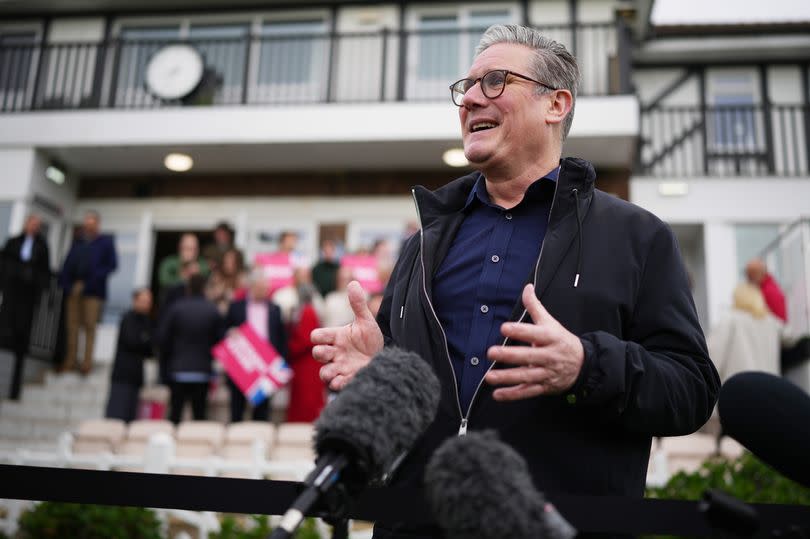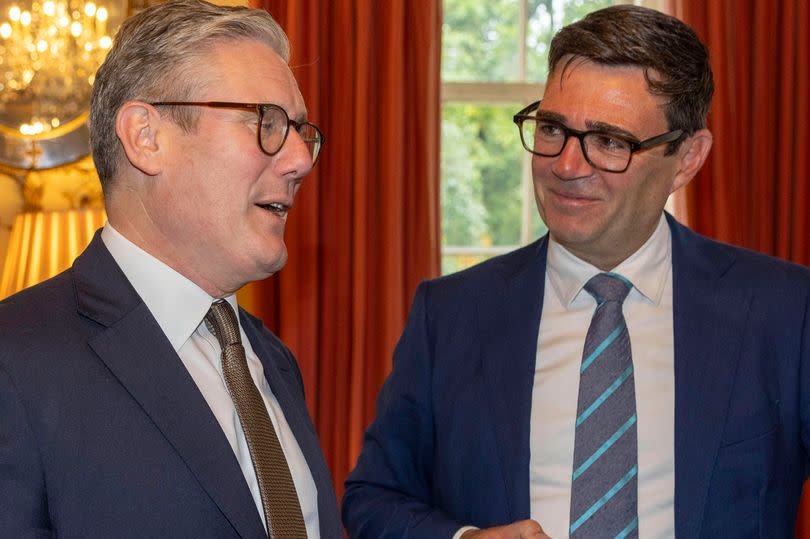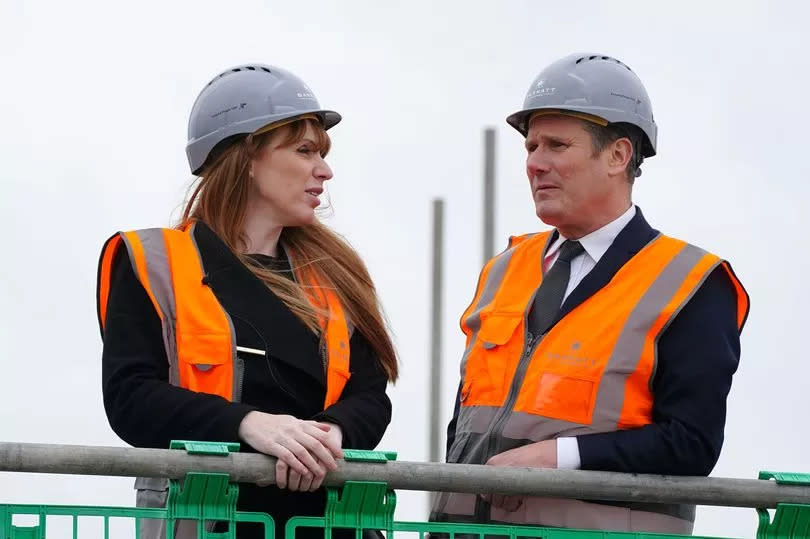What new Labour government means for the future of an elected Lancashire Mayor

What now for a devolved Lancashire - and the prospect of an elected Mayor for the region? The historic agreement - struck last year - was set to create a new Lancashire Combined County Authority. But with the country going to the polls before legislation could be passed through parliament, could the future of the deal now be in doubt?
It is understood no decision has yet been taken over whether the deal for Lancs - struck with the last Conservative government - will be implemented in its current form by the new Labour administration. Newly-appointed ministers have yet to turn their attention to the matter - and the three Lancashire authorities which signed the county’s provisional devolution agreement late last year have not so far been advised whether the government’s intention is to rubber stamp the document or revisit it.
The Lancashire deal was finally committed to paper – after more than seven years of failed attempts – at a special ceremony at Lancaster Castle in November. It was poised to be put before Parliament this summer – following a period of public consultation earlier in the year – but the process was derailed by the calling of the snap general election in May.
READ MORE: 57 of Blackburn and Darwen's oldest traffic lights are set to be replaced
Had the necessary legislation been concluded, a new Lancashire Combined County Authority (CCA) was expected to have been up and running to oversee Lancashire’s devolved powers by the autumn. The future of the agreement in light of Labour’s election victory is complicated by the fact that the seven district councils the party controls in Lancashire, along with the Labour opposition group at Lancashire County Council, have either opposed the deal outright or at least expressed serious reservations about what is – and is not – contained within it.
Yet two of the signatories to the document – Blackpool and Blackburn with Darwen councils – are themselves Labour controlled. Together with the county council’s Conservative administration, the trio of so-called ‘top-tier’ authorities have championed the deal as one which puts Lancashire on “the devolution bus” – with the potential to deepen the arrangement further down the road.
The leaders of those councils have each told the LDRS that they are keen to see the current ‘level 2’ deal – on a scale of three possibilities – now implemented, regardless of what else may be on offer for Lancashire from the new government in future. County council leader Phillippa Williamson said Lancashire has “a good devolution deal on the table and [is] ready to deliver that immediately”.
“We know this deal gives us a foundation for future deals and are looking forward to hearing from government, so we can get on and deliver – with businesses and other partners – the economic growth this deal will bring to Lancashire,” County Cllr Williamson said.
Phil Riley, the leader of Blackburn with Darwen Council, stressed the “really significant support” that the agreed deal had been given by Lancashire businesses – telling the LDRS that the “the sensible thing” for the new government to do was “to progress the deal that is on the table and has been consulted upon”. “After that, we can obviously talk about what happens next,” Cllr Riley said.
Meanwhile, Blackpool Council leader Lynn Williams said she wanted to see “as much power and resource as possible devolved from Westminster to Lancashire and Blackpool”. She added: “In common with the new Labour government, we believe that local decision making will bring the most growth to our economy and opportunities for our community. The significant progress we have already made together as three upper-tier authorities – on a shared agenda and toward the creation of a CCA – are a necessary first step toward our long-term goals.
“The new Prime Minister has discussed the formation of a Council of the Regions and Nations – it is vital that Lancashire, an economy bigger than Merseyside, is represented there,” Cllr Williams said. However, the county council’s Labour opposition group leader, Matthew Tomlinson, reasserted his group’s view that Lancashire could secure a better deal – but appeared slightly more sanguine than when he and his members voted against the present agreement in March about whether that meant building on the current framework or starting from scratch.
“Labour in Lancashire remain committed to the view that devolution to local communities can provide unique opportunities to drive forward the new government’s growth agenda. Our view on the current offer, negotiated by the Conservatives at County Hall, is that it doesn’t go far or fast enough. Whether the current deal is signed off by the new government or not, [it] will not diminish our view that the best option for our county is an elected mayor such as those in Manchester or Liverpool. We are prepared to be active and willing participants in any discussions to move that agenda forward,” County Cllr Tomlinson said.
IS LANCASHIRE ABOUT TO START ARGUING OVER A MAYOR AGAIN?

The prospect of creating an elected mayor - similar to the role Andy Burnham performs for Greater Manchester - has proved a perennial sticking point amongst Lancashire’s 15 councils – often irrespective of political persuasion – during the now eight years of deliberations about how to secure a devolution deal for the county. It was the difficulty of achieving Lancashire-wide consensus on the issue that seems to have prompted the three top-tier authorities who signed the yet-to-be-implemented agreement to pursue a level 2 deal last year.
The then Conservative government’s devolution model would have demanded a mayor in return for a more extensive – level 3 – deal, which could have offered power over the likes of local rail, greater control over brownfield regeneration and the creation of a long-term investment fund, with an annual cash allocation.
Under the Lancashire agreement – if it is ultimately implemented – the county will gain control over the adult education budget, powers to better integrate local transport and a £20m one-off fund to support “innovation-led growth” in areas such as cyber defence and green energy. Early indications are that at least some of Lancashire’s newly-elected Labour MPs – like the county council Labour group – are going to be lobbying their new government for a mayoral deal for the county.
South Ribble MP Paul Foster – who was leader of South Ribble Borough Council until he stepped down last weekend – says he has not changed his view that Lancashire should get a deal to match the likes of Greater Manchester and the Liverpool City Region. He told BBC Radio Lancashire this week that he was “adamant” Lancashire needed an elected mayor in order to have “a voice”.
South Ribble and neighbouring chorley-council>Chorley Council voted against the current deal earlier this year. Meanwhile, the new Blackpool North and Fleetwood MP – and long-serving Lancashire county councillor – Lorraine Beavers – said on Radio Lancashire on Tuesday that the existing agreement was “not a good deal – it didn’t give us the powers that we need”, and added that a mayor was “the only way forward”.
However, Blackburn with Darwen Council’s Labour leader Phil Riley told the LDRS that the significance of the mayoral question depended on whether the new administration intended to retain “the division of powers” on offer between levels 2 and 3 – and the local governance arrangements required for each.
He said that, in his view, the ideal situation would be if the mayoral demand for level 3 was ditched, allowing Lancashire to enhance its current deal and “increase the number of powers” available to the county. If they don’t keep that split of powers and actually say, ‘Just get on with the thing’, then the conversation becomes a question of whether we really need a mayor of Lancashire and what exactly it [would be] for,” Cllr Riley said.
WHAT IS THE LABOUR GOVERNMENT SAYING ABOUT DEVOLUTION?

One of Sir Keir Starmer’s first moves as Prime Minister this week was to trumpet his party’s plans for devolving power to local areas during a Downing Street event for metro mayors from places including Lancashire’s neighbours of Greater Manchester and the Liverpool City Region. While Labour’s exact stance on how it wants to see devolution delivered in Lancashire is yet to emerge, the new government seems – in general terms – to have nailed its colours firmly to the mayoral mast.
Sir Keir Starmer said ahead of his meeting with the mayors that it was his “fundamental belief that those with skin in the game are the ones who know best what they need”. “That’s why, for many years, I have been in constant dialogue with metro mayors across the country about what works for their areas, and I will continue that now as Prime Minister.
“By resetting these crucial relationships and putting more power in the hands of local leaders, I’m determined to make sure they have the support they need to play their part in delivering economic growth in every part of the country,” the Prime Minister added. His deputy – and communities secretary – Angela Rayner also promised “upcoming devolution legislation” to enable local areas to “take back control”. Its contents will be eagerly anticipated by politicians at all levels in Lancashire – but the question of whether the government will restate, renegotiate or even rip up the deal the county thought it had already secured has yet to be answered.

 Yahoo News
Yahoo News 
